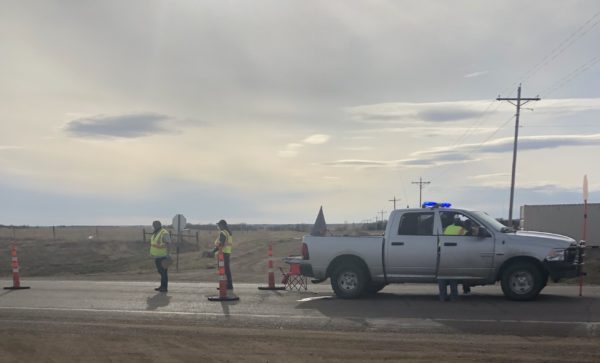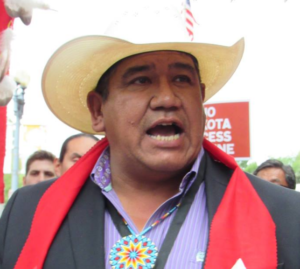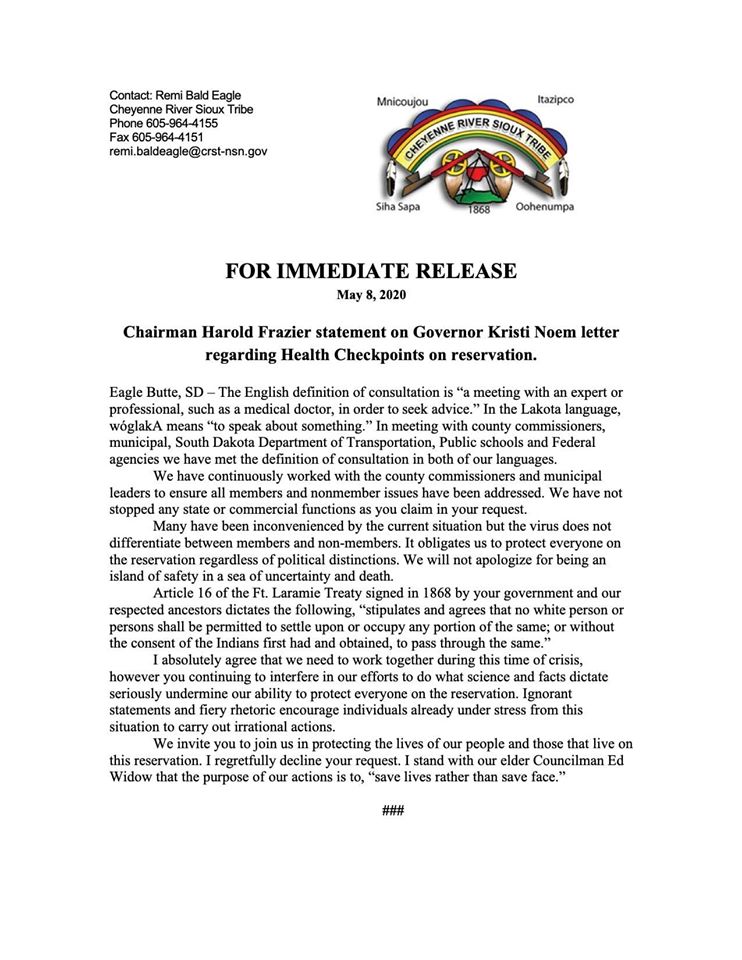
- Details
- By Levi Rickert
PIERRE, S.D. — The leaders of the Cheyenne River Sioux Tribe and Oglala Sioux Tribe received letters from South Dakota Governor Kristi Noem on Friday telling them they need to remove the checkpoints onto their respective Indian reservations.
Noem’s letters were sent to Cheyenne River Sioux Tribe Chairman Harold Frazier and Oglala Sioux Tribe President Julian Bear Runner.
 South Dakota Gov. Kristi Neom
South Dakota Gov. Kristi Neom
While the letters were written as requests to tribes to remove the checkpoints, Gov. Noem gave each tribe 48 hours to remove the checkpoints or face legal action.
On Friday afternoon, both tribes said they would not take down the checkpoints that were installed to keep outsiders out and insiders in the reservation to curtail the spread of the deadly coronavirus.
Oglala Sioux Tribe’s spokesperson Chase Iron Eyes told Native News Online on Friday afternoon that the tribe has no intention to remove the 10 checkpoints at the Pine Ridge Indian Reservation and welcomes an opportunity to sit down with the governor to discuss the matter.
“We are not going to let her treat us like domestic dependents. We make our own laws for our tribal nation,” Iron Eyes said. “Why would we allow the illegal aliens to bring disease onto our homelands.”
Iron Eyes said he feels the Gov. Noem has mishandled the COVID-19 pandemic and has not taken strong enough action.
“She has relied on South Dakotans to exercise common sense and resiliency to fight the virus. Our tribal nation has been stronger with our lockdowns,” Iron Eyes said.
Cheyenne River Sioux Tribe’s Chairman Frazier says his tribe has worked with county commissioners and other officials.
“Many have been inconvenienced by the current situation, but the virus does not differentiate between (tribal) members and non-members. It obligates us to protect everyone on the reservation regardless of political distinctions. We will not apologize for being an island of safety in a sea of uncertainty and death,” Chairman Frazier said in a statement released Friday afternoon. “I stand with our elder Councilman Ed Widow that the purpose of our actions is to ‘save lives rather than save face.’”
In his statement, Chairman Frazier cites the 1868 Ft. Laramie Treaty that says “no white person or persons shall be permitted to settle upon or occupy any portion of the same; or without the consent of the Indians first had and obtained, to pass through the same.”
 Cheyenne River Sioux Tribe Chairman Harold Frazier. Native News Online photograph by Levi Rickert
Cheyenne River Sioux Tribe Chairman Harold Frazier. Native News Online photograph by Levi Rickert
One Democratic South Dakota state senator, who is a Lakota and Navajo, weighed in on the showdown between the governor and tribes.
“Treaties are the supreme law of the land and must be enforced, even though the state roads go through sovereign tribal nations, they change jurisdiction. Tribes, as sovereign nations, are responsible for protecting our people,” said State Senator Red Dawn Foster, whose senate district covers the Pine Ridge Indian Reservation.
“They have taken into consideration the high number of vulnerable populations with underlying health issues, our healthcare facilities’ capacity, remote location and distance our citizens have to travel for access to healthcare and have determined checkpoints are necessary components to keeping our people safe.”
 CORRECTION: An earlier version of this story contained an editing error. The spokesperson for the Oglala Sioux Tribes is Chase Iron Eyes, not Clare Iron Eyes.
CORRECTION: An earlier version of this story contained an editing error. The spokesperson for the Oglala Sioux Tribes is Chase Iron Eyes, not Clare Iron Eyes.
More Stories Like This
Biden Nominates Salish & Kootenai Tribal Attorney Danna Jackson for Federal BenchA Conversation With Lt. Gov. Peggy Flanagan: What We Can Celebrate Around the State
Return to the Heart Foundation Gives 44 Micro-Grants to Native Women Leaders
Indigenous Journalists Association President Addresses Members of the UNPFII
Inter-Tribal Council Passes Resolution Urging FCC to Establish Specific Event Code for Missing and Endangered Persons
Native Perspective. Native Voices. Native News.
We launched Native News Online because the mainstream media often overlooks news that is important is Native people. We believe that everyone in Indian Country deserves equal access to news and commentary pertaining to them, their relatives and their communities. That's why the story you’ve just finished was free — and we want to keep it that way, for all readers. We hope you'll consider making a donation to support our efforts so that we can continue publishing more stories that make a difference to Native people, whether they live on or off the reservation. Your donation will help us keep producing quality journalism and elevating Indigenous voices. Any contribution of any amount — big or small — gives us a better, stronger future and allows us to remain a force for change. Donate to Native News Online today and support independent Indigenous-centered journalism. Thank you.

